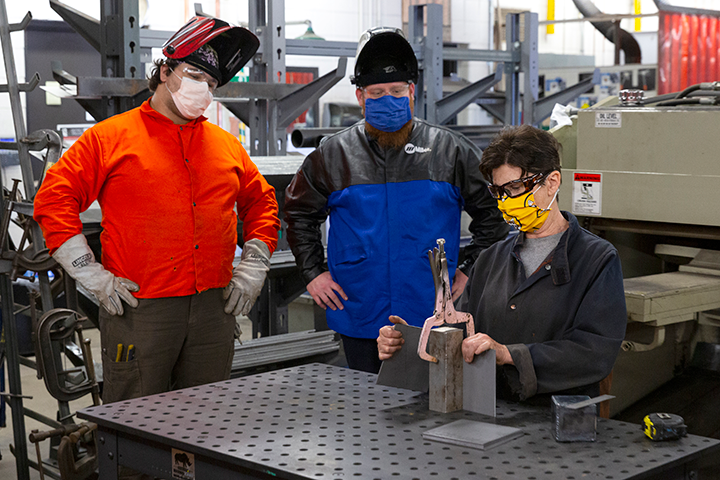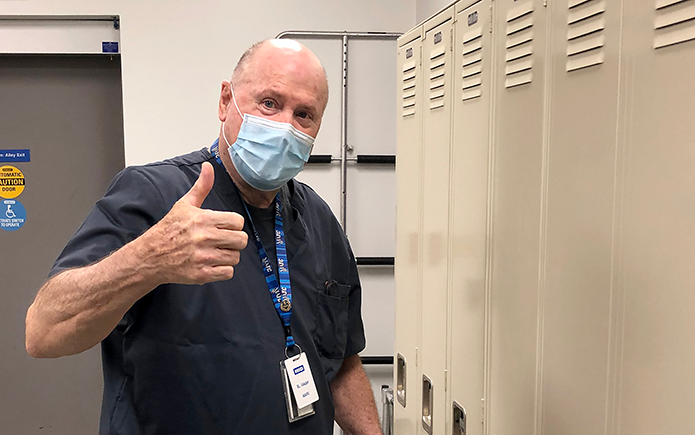
MATC instructor Sue Silverstein, shown right, with welding students at the Oak Creek Campus in May 2020
As COVID-19 spread across the globe, MATC faculty and students have been forced to re-examine how they teach and learn.
The college community adjusted to offering primarily online instruction within a matter of weeks. For each student, instructor, dean or staff member, this transition looked a little different.
One thing remains unwavering – MATC’s strong commitment to its students’ success.
Commitment to adaptability
As dean of online learning, Dr. Pam Holt’s job is to help determine best practices related to online coursework. When the pandemic started, Dr. Holt and her team worked urgently to ensure that faculty and students were fully supported when nearly 1,750 sections moved from on-campus to remote instruction.
Critical to online student success is instructor proficiency with the digital platforms, so faculty and staff received training to help foster a smooth transition.
While the majority of the classes could be fully transitioned, some that required hands-on learning had a limited transition to the online environment. “Labs, practicals for health sciences, emergency medical services and police training are some examples,” Dr. Holt noted.
For instructors and students whose courses required in-person labs, the key focus was remaining creative and flexible.
Dina Borysenko, a biochemistry instructor, helped facilitate “kitchen labs” for her courses. “I’m doing as much as I can to make it a biochemistry learning experience for them at home. We had isolation of DNA from a strawberry, and the students really liked it,” she said.
Eugene Reyes is the director of the police academy at MATC’s Oak Creek Campus. In week eight of the 18-week training, his recruit officer candidates shifted to online courses, such as completing soft-skills training requirements related to domestic violence and sexual assault police work, and constitutional law.
On May 18, the academy restarted face-to-face training, becoming MATC’s first course to resume in a physical capacity. As an essential service, the training met the requirements of Wisconsin’s Safer at Home order. The academy accomplished this by adhering to the U.S. Centers for Disease Control and Prevention (CDC) guidelines to help prevent the spread of COVID-19.
“Every morning, the students and the staff would get a temperature check using the infrared monitor, as well as being issued masks, gloves and eye protection,” Reyes said. “Instructors made time in their coursework to decontaminate everything after using the equipment.”
Although the shift was unexpected, Reyes has full confidence that the officer recruits will be as well trained as previous cohorts. “They are ready for the real world,” he said. “In regards to the materials, content and instruction, I am 100% confident that they’re going to do just fine.”
Apprenticeship instructors also found new ways to continue their programs virtually by blending online assignments. “The apprentices are definitely eager to get back to the face-to-face instruction,” said David Polk, director of apprenticeships. “Both the employers and apprentices have been very understanding of the situation and have made the most of the blended learning format.”
Real-world learning and mentoring remained the focus of virtual summer internships for 10 MATC students chosen to join the Milwaukee program, The Commons. During their 10-week paid internships, students helped develop projects with an entrepreneurial theme and technology component, collaborating online with participants from other colleges and universities.
Commitment to educational success
MATC recently introduced Academic & Career Pathways as a new structure to help more students graduate and connect to a career, a four-year degree or both. Student support is a critical element of the Pathways framework.
Pam Schoessling regularly connects with students in her role as manager of Pathways retention coaching, and those communications became more frequent during the pandemic. She and her team “worked with the students by calling them and listening to their stories and the pains of what they were going through,” she said.
When the college announced that in-person classes would be suspended, students who were in the routine of going to campus suddenly had to figure out ways to complete assignments at home. For some, this was no easy task.
“It was a mix of people not having the technology or not having computers,” Schoessling explained.
Everybody seems to be kind and patient while trying to get through this together. I’ve felt so much unity in my relationships with the faculty and fellow students.
Commitment to resources — Chromebooks
Donors such as Herb Kohl Philanthropies stepped up with additional support. The MATC Foundation increased the number of students served through emergency grants and technology assistance by nearly 350% compared to the prior academic year. During the crisis, MATC announced it would distribute Chromebook computers to students who needed them to continue their coursework online, at no cost to the student. Leesa McGhee was a student who received one.
“I was offered a Chromebook to help with the transition to online-only classes because I didn’t have the technology. Otherwise I wasn’t going to be able to finish,” she said.
McGhee was just getting comfortable with the routine of being in school after a 30-year hiatus.
Before the COVID-19 outbreak, she had a 4.0 grade-point average and was worried that the transition would affect the hard work she had put into her studies.
“The Chromebook has helped me tremendously,” said McGhee. “I feel really good about everything. Everybody seems to be kind and patient while trying to get through this together. I’ve felt so much unity in my relationships with the faculty and fellow students.”
In June, the college offered free Wi-Fi in several campus parking lots so that students could complete coursework in their vehicles. The college also offered IT Helpdesk live chats for assistance with any technology-related questions.
Commitment to relationships
MATC faculty found ways to connect authentically in an online environment. Marianne Bovee, a philosophy and ethics instructor, made sure that her relationships with students remained as close to intact as possible.
For some of her classes, the retention rate – the number of students who complete a course – improved during the crisis. Bovee believes the increase is because she gave students her cellphone number, something she had not done before.
“Because of the crisis, there’s been more of a concern for others’ lives in a fundamental way,” she said. “Giving out my number helped to have that connection to my students through this pandemic.”
To further build student relationships through class discussions, Bovee used a feature of the learning management tool Blackboard that allowed students to phone in and participate if they did not have computer access at the time. She also recorded the classes so students could access them later.
One student, Nicholas Gill, identifies himself as a hands-on learner but said his experience with the transition, particularly in Bovee’s class, helped him succeed. “I think she actually did take the best steps in making sure that we had the best experience,” said Gill. “She had live time for questions and to go over the material as if we were in the class. It definitely helped a lot.”

Ralph Haas, MATC part-time embalming and restorative art lab instructor, wears mask while teaching at the West Allis Campus
Commitment to the future
“I think that this whole experience has helped instructors with being able to navigate online, which I think is important to meet more students’ needs,” said Bovee. “Necessity is the mother of invention. Sometimes when you’re forced to do something, then you’re going to be able to utilize those skills you learned to make a better future.”
Through the lessons learned from the Spring 2020 semester, MATC students, instructors and administrators have a strong framework for responding to changing needs and opportunities in the Fall and future semesters.
To help students during the COVID-19 crisis, visit matc.edu/donate and support the Dreamkeepers Student Emergency Fund.

